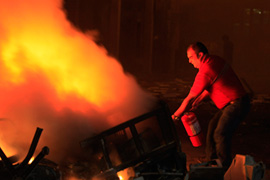Several dead in Bolivia protests
Deadly clashes between erupt between opponents and supporters of Morales government.

The protests have sparked a regional diplomatic row after Bolivia expelled the US ambassador, accusing him of inciting violence.
The US responded by expelling the Bolivian envoy to Washington.
Hugo Chavez, the Venezuelan leader, then expelled the US ambassador to his country, in what he said was solidarity with the Morales government.
Continuing unrest
The Bolivian government has blamed the unrest on the leaders of four states who demand greater autonomy and energy revenue and oppose his plans to change the constitution and distribute land to the poor.
 |
| Protests have erupted in several regions of Bolivia [Reuters] |
Ruben Gamarra, the interior minister, said “what started out as a violent attack against the state is becoming a violent internal conflict fomented by the regional governors … of several regions”.
Opponents of Morales occupied government buildings in the opposition stronghold of Santa Cruz for a third consecutive day on Thursday.
Clashes also erupted in Tarija, a region rich in natural gas.
Morales, opening a public works project in La Paz, said: “We are going to be patient and cautious. We are going to hang in there. But patience has its limits, really.”
Political turmoil
South America’s poorest nation has been in the grip of political turmoil for months.
Last month, Morales convincingly won a referendum on his rule but in the rebel states, voters also returned most of the governors forming the opposition coalition.
After failed negotiations to find a compromise solution, Morales announced a new referendum, to take place in December, to vote on his rewritten constitution, which would redistribute land and national revenues to give more to the indigenous population.